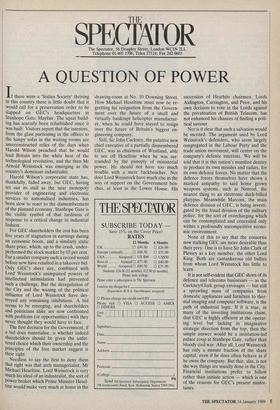SPECT THE AT OR
The Spectator, 56 Doughty Street, London WC1N 2LL Telephone 01-405 1706; Telex 27124; Fax 242 0603
A QUESTION OF POWER
Harold Wilson's corporatist state has, thankfully, faded away, but GEC, having set out its stall as the near monopoly provider of engineering and electronic services to nationalised industries, has been slow to react to the dismemberment of the planned economy. Stanhope Gate is the visible symbol of that tardiness of response to a critical change in industrial fashion.
For GEC shareholders the cost has been five years of stagnation in earnings during an economic boom, and a similarly static share price, which, up to the crash, under- performed the stock market by 65 per cent. For a smaller company such a record would before now have resulted in a takeover bid. Only GEC's sheer size, combined with Lord- Weinstock's unimpaired powers of intellectual intimidation had prevented such a challenge. But the deregulation of the City and the waning of the political influence of Lord Weinstock have des- troyed any remaining inhibitions. A bid seems to be emerging, and shareholders and politicians alike are now confronted With problems (or opportunities) with they never thought they would have to face.
The first decision for the Government, if a bid does materialise, is whether indeed shareholders should be given the unfet- tered choice which their ownership and the principles of the free market suggest is their right.
Needless to say the first to deny them that right was that arch managerialist, Mr Michael Heseltine. Lord Weinstock is very much his ideal of an industralist, the sort of Power broker which Prime Minister Hesel- tine would make very much at home in the drawing-room at No. 10 Downing Street. How Michael Heseltine must now be re- gretting his resignation from the Govern- ment over the future of a small and virtually bankrupt helicopter manufactur- er, when he could have stayed to resign over the future of Britain's biggest en- gineering company.
Still, Sir John Cuckney, the putative new chief executive of a partially dismembered GEC, was as chairman of Westland, able to see off Heseltine when he was sur- rounded by the panoply of ministerial power. He should not have too much trouble with a mere backbencher. Nor does Lord Weinstock have much else in the way of support on the Government ben- ches, at least in the Lower House. His succession of Heathite chairmen, Lords Aldington, Carrington, and Prior, and his own decision to vote in the Lords against the privatisation of British Telecom, has not enhanced his chances of finding a poli- tical saviour.
Nor is it clear that such a salvation would be merited. The argument used by Lord Weinstock's defenders, who seem largely congregated in the Labour Party and the trade union movement, will centre on the company's defence interests. We will be told that it is this nation's manifest destiny to produce its own missiles and radars, for its own defence forces. No matter that the defence forces themselves have shown a marked antipathy to, said home grown weapons systems, such as Nimrod, the nearest thing to an electronic duck-billed platypus. Meanwhile Marconi, the main defence division of GEC, is being investi- gated by the fraud division of the military police, for the sort of overcharging which can be contemplated and concealed only within a profoundly uncompetitive econo- mic environment.
None of this to say that the consortia now stalking GEC are more desirable than their prey. One is to have Sir John Clark of Plessey as a key member, the other Lord King. Both are cantankerous old bullies from whom Lord Weinstock has little to learn.
It is not self-evident that GEC shorn of its defence and telecoms businesses — as the Cuckney/Clark group envisages — but still a sprawling mass of companies from domestic appliances and furniture to ther- mal imaging and computer software, is the path of industrial logic. If it is true, as many of the investing institutions claim, that GEC is highly efficient at the operat- ing level but lacking in imaginative strategic direction from the top, then the simple answer would be a institution-led palace coup at Stanhope Gate, rather than bloody civil war. After all, Lord Weinstock has only a minute fraction of the share capital, even if he does often behave as if he owns the company. But that, alas, is not the way things are usually done in the City. Financial institutions prefer to follow rather than initiate action — which is one of the reasons for GEC's present misfor- tunes.


















































 Previous page
Previous page